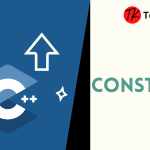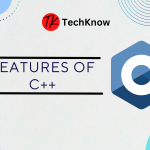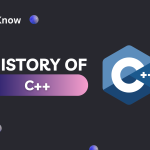Table of Contents
What is C++
Bjarne Stroustrup created the potent, high-level programming language C++ at Bell Labs in 1979. The term “C++” refers to an increment from the C programming language, since it is an extension of that language. Because it supports procedural and object-oriented programming paradigms and is a flexible language that can be used for a wide range of software development tasks.
Key Features of C++
1. Object-Oriented Programming (OOP)
- The foundational concepts of object-oriented programming—classes and objects—are introduced in C++. This makes it possible for developers to simulate real-world things and their interactions.
- Encapsulation, Inheritance, Polymorphism, and Abstraction are the four pillars of OOP in C++.
2. Low-Level Manipulation
- Programmers have fine-grained control over system resources thanks to C++’s low-level operations and pointer and direct memory access features.
3. Standard Template Library (STL)
- A set of template classes and functions for data structures (such as vectors, lists, and stacks) and algorithms (such as sorting and searching) are provided by the STL, a potent feature.
4. Portability
- It is a portable language ideal for cross-platform programming since it can compile on many platforms with little to no modifications.
5. Efficiency
- Time and space efficiency are key design elements of C++. It gives programmers the resources they need to maximise the performance of their creations.
Learn on Youtube:
C++ Tutorial
Uses of C++
C++ is a versatile language with applications across various domains. Here are some of the primary uses:
1. System Software
- Operating systems, device drivers, and other system-level software are frequently developed using C++. For these kinds of applications, its direct hardware interaction and effective resource management make it perfect.
- Examples include Microsoft Windows, parts of macOS, and Linux-based operating systems.
2. Game Development
- C++ is widely used in the game industry because of its excellent performance and ability to manage system resources. C++ is used for essential functionality in game engines like Unreal Engine and Unity (which employ C# scripting). Game developers may manage intricate physics simulations, process user input in real time, and produce intricate graphics using C++.
3. Embedded Systems
- C++ is frequently used in embedded systems because of its performance and capacity to function in resource-constrained contexts. Examples of these systems include those found in automobiles, medical equipment, and household appliances. This kind of application require fine-grained control over hardware, which C++ provides.
4. Financial Software
- In the financial sector, C++ is frequently used to create trading platforms, risk management tools, and other high-performance financial applications. For this industry, its capacity to manage massive data volumes and carry out intricate computations in real time is crucial.
5. Web Browsers
- The main rendering engines of popular web browsers, including Google Chrome, Mozilla Firefox, and Safari, are based on C++. Web page rendering and HTML, CSS, and JavaScript processing are handled by C++.
6. Scientific Computing
- In fields such as physics, chemistry, and bioinformatics, C++ is used to create simulations and perform complex computations. Its speed and ability to handle large datasets make it suitable for high-performance scientific computing.
7. Database Management Systems
- Database management systems (DBMS) like MySQL and MongoDB are developed using C++. Its effectiveness in handling massive amounts of data and guaranteeing quick query processing depend heavily on its control over memory management.
Why Learn C++?
1. Foundation of Modern Programming
- Learning C++ helps in understanding the fundamentals of computer science and programming. It lays the foundation for understanding more complex languages and concepts.
2. Widely Used
- System software, game development, real-time systems, and applications needing high-performance computation are just a few of the fields in which C++ finds application.
3. Career Opportunities
- Knowledge of C++ opens doors to many career opportunities in software development, especially in industries like finance, gaming, and embedded systems.
4. Community and Resources
- Because of its large developer community and abundance of resources, C++ makes it simpler for beginners to get assistance and advance their knowledge.
Basic Syntax of C++
Here’s a simple “Hello, World!” program in C++ to get you started:
#include <iostream>
int main() {
std::cout << "Hello, World!" << std::endl;
return 0;
}Explanation
- #include <iostream>: This line imports the library for input/output streams, enabling the application to use std::cout is used for output.
- Every C++ program starts with the main function, which is defined by int main() {… }.
- The line “std::cout “Hello, World!” sends “Hello, World!” to the console.
- return 0;: This line of code terminates the program’s main function and tells the operating system that it finished properly by returning 0.
History and Evolution of C++
- C++’s original moniker, “C with Classes,” reflected both its novel class feature and its ties to the C programming language. With the inclusion of additional features like exception handling, templates, and the STL, it developed into C++ over time. The International Organisation for Standardisation (ISO) has standardised the language, and it has been available in multiple versions over time, including C++98, C++03, C++11, C++14, C++17, C++20, and the soon-to-be C++23.
Advantages of C++
C++ offers several advantages that make it a popular choice for many developers:
- High Performance: Because of its great speed and performance, it is a great choice for creating software that needs to analyse data in real time and manage memory effectively.
- Object-Oriented Programming: OOP concepts are supported by C++, improving code organisation and modularity. Large software projects are now simpler to maintain and manage as a result.
- Rich Library Support: A vast array of pre-built functions and data structures are available in the C++ Standard Template Library (STL), which expedites development and minimises the need for manual code.
- Memory Management: C++ offers direct control over memory management through pointers and dynamic memory allocation, enabling developers to optimize the use of system resources.
- Mature and Stable: Despite being one of the oldest programming languages, C++ has a large, mature, and active community. The language itself is stable, with well-established best practices and extensive documentation.
- Versatility: System software and game creation are just two of the many uses for C++, which makes it a flexible language suitable for a wide range of tasks.
Disadvantages of C++
Despite its many advantages, C++ also has some drawbacks:
- Complexity: C++ is a difficult language to master, especially for those who are just starting out. It can be challenging to learn its syntax and features, especially for people who are not familiar with programming.
- Manual Memory Management: While C++ provides powerful memory management features, it also requires developers to manage memory manually, which can lead to errors such as memory leaks and segmentation faults if not handled correctly.
- Lack of Garbage Collection: Unlike some modern programming languages, C++ does not have built-in garbage collection. This means that developers must explicitly manage memory allocation and deallocation, which can be error-prone.
- Long Compilation Time: C++ programs can have long compilation times, especially for large projects with multiple dependencies. This can slow down the development process.
- Platform Dependency: While C++ is portable, certain platform-specific features and libraries can introduce dependencies that make the code less portable across different environments.
- Less Safe: C++ allows for low-level programming, which can lead to safety issues like buffer overflows, pointer errors, and undefined behavior. This requires developers to be extra cautious when writing code.
Reference Materials:
- “The C++ Programming Language” by Bjarne Stroustrup: Written by the creator of C++, this book is often considered the definitive guide to the language. It covers the language in-depth, from basic concepts to advanced features.
- “Effective C++” by Scott Meyer: This book provides practical advice and best practices for writing efficient, high-quality C++ code. It’s an excellent resource for both beginners and experienced developers.
Conclusion
C++ is a language with a rich history and a broad range of applications. Whether you’re interested in systems programming, game development, or just want to strengthen your programming foundation, learning C++ is a worthwhile investment. This introductory post is just the beginning; in subsequent posts, we’ll dive deeper into the language’s features, syntax, and best practices.
Get:
Alight Motion Mod apk
Learn More:
Features of C++










